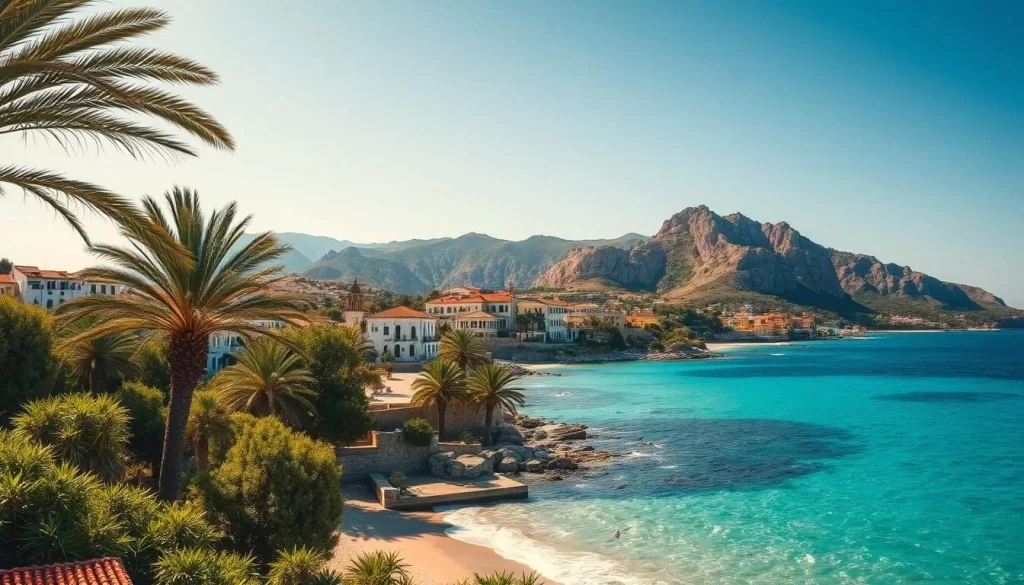✓ Accommodations✓ Flights✓ Rental Cars✓ Tours & Activities
Planning a trip to the Ionian Islands? Timing is everything. The Mediterranean climate here offers warm, dry summers and mild, wetter winters, making it essential to choose the right month for your visit.
Spring and early fall are ideal, with pleasant temperatures and fewer crowds. From April to June, you’ll enjoy blooming landscapes and comfortable weather, while September and October offer warm days perfect for outdoor adventures.
Understanding the local weather patterns helps you avoid the peak tourist season and enjoy a more relaxed trip. Whether you’re exploring beaches or historic sites, planning around the best time ensures a smooth and memorable experience.
Understanding Greece’s Mediterranean Climate
Exploring the Mediterranean climate of Greece reveals a fascinating mix of weather patterns. This climate is known for its mild, wet winters and hot, dry summers. These distinct seasons shape the region’s natural beauty and influence the best times to visit.

Climate Overview and Seasonal Patterns
In southern regions, winter temperatures average between 50°F (10°C) and 60°F (16°C), while summers can soar to 100°F (38°C). Northern areas, like Thessaloniki, experience colder winters, with temperatures dropping to 32°F (0°C). Spring brings milder weather, with averages ranging from 57°F (14°C) to 77°F (25°C).
July and August are the hottest months, with Athens reaching an average temperature of 91°F. Rainfall is minimal during these months, making it ideal for outdoor activities. In contrast, November and December see cooler temperatures and increased rainfall.
Regional Variations and What They Mean for You
Major cities like Athens and Thessaloniki showcase stark contrasts. Athens enjoys a dry summer with extended sunny days, while Thessaloniki experiences colder winters and occasional snowfall. Southern islands, such as Crete and Corfu, remain milder year-round, with winter rain mainly from October to March.
Understanding these patterns helps you choose the right season for your trip. Whether you prefer warm beaches or cooler mountain escapes, Greece’s diverse climate has something for everyone.
| Region | Winter Temperature | Summer Temperature |
|---|---|---|
| Southern Greece | 50°F – 60°F | 90°F – 100°F |
| Northern Greece | 32°F – 50°F | 75°F – 90°F |
Month-by-Month Guide: Discovering the Ideal Time to Visit
Choosing the right time to explore this region can make all the difference in your travel experience. Whether you’re seeking warm beaches or cooler mountain escapes, this guide breaks down the best time visit based on weather and activities.

Spring and Early Summer Highlights
Spring is a magical time to visit, with mild temperatures and blooming landscapes. March starts with highs of 16°C (61°F), while April sees temperatures rise to 18°C (65°F). By May, the weather is consistently sunny, making it ideal for outdoor adventures.
Early summer, from June to July, brings warm conditions perfect for sightseeing and swimming. June temperatures average 26°C (79°F), with the sea warming up for beach activities. However, late June marks the start of peak crowds, so plan accordingly.
Fall and Winter Considerations
Fall offers pleasant weather with fewer tourists and lower prices. September temperatures average 26°C (79°F), making it a great time visit for warm days and comfortable evenings. October begins the shoulder season, with highs of 23°C (73°F) and reduced crowds.
Winter is milder in coastal areas, with December highs around 15°C (59°F). While northern regions can be colder, this season is perfect for those seeking a quieter experience and budget-friendly travel options.
Ionian Islands, Greece: Best Months for a Weather-Savvy Trip
Timing your visit can make or break your travel experience. Balancing peak and shoulder seasons ensures you enjoy the best weather while avoiding overwhelming crowds. Whether you’re drawn to vibrant summer activities or prefer a quieter escape, understanding these periods is key.
Balancing Peak Seasons and Shoulder Periods
July and August are the busiest months, with temperatures often exceeding 90°F (32°C). These months are perfect for beach activities and vibrant nightlife, but they also attract large crowds. If you thrive in lively environments, this is the ideal time to visit.
Shoulder seasons, like May, June, September, and October, offer a more relaxed experience. Temperatures remain warm, and you’ll find fewer people at popular attractions. This balance of pleasant weather and manageable crowds makes these months a favorite for many travelers.
Managing Crowds and Enjoying Lower Prices
Traveling during peak season often means higher prices for flights and accommodations. However, shoulder seasons provide opportunities for significant savings. For example, September offers warm sea temperatures and lower costs, making it a great time to explore.
To avoid the busiest dates, consider booking your trip in late April or early October. These periods combine comfortable weather, affordable prices, and fewer crowds, ensuring a more enjoyable experience.
By planning strategically, you can enjoy the best of both worlds—ideal weather and a more relaxed atmosphere. Whether you’re exploring historic sites or lounging on the beach, timing your visit wisely makes all the difference.
Seasonal Attractions, Festivals, and Outdoor Activities
Immerse yourself in the vibrant culture and natural beauty of this Mediterranean destination. From lively celebrations to thrilling outdoor activities, there’s something for everyone to enjoy throughout the year.

Local Events and Cultural Celebrations
Experience the rich traditions of the region through its many festivals. The Carnival of Patras, held in February or March, is a three-day extravaganza filled with parades and costumes. Orthodox Easter, usually in April, is another major event, marked by solemn processions and festive meals.
In September, the Aegina Pistachio Festival celebrates the island’s famous crop with music, dancing, and local delicacies. For art enthusiasts, the Athens and Epidaurus Festival runs from June to August, offering performances in ancient venues.
Outdoor Adventures and Unique Island Experiences
Explore the stunning beaches and crystal-clear water that make this region a paradise for outdoor enthusiasts. Summer months are perfect for swimming, snorkeling, and sailing, with temperatures averaging 86°F in July.
For a more relaxed pace, consider island-hopping during the shoulder seasons. Spring and fall offer milder weather, ideal for hiking and exploring historical sites. The Nafplion Festival in late June celebrates maritime history with events that showcase the region’s rich heritage.
| Event | Month | Highlights |
|---|---|---|
| Carnival of Patras | February/March | Parades, costumes, and festivities |
| Orthodox Easter | April | Processions and traditional meals |
| Aegina Pistachio Festival | September | Music, dancing, and local delicacies |
| Athens and Epidaurus Festival | June-August | Performances in ancient venues |
Whether you’re drawn to cultural celebrations or adventurous activities, planning your trip around these events ensures a memorable experience. For more tips on the best time to visit Greece, explore our detailed guide.
Travel Guidance: Packing Essentials and Transportation Tips
Ensuring a smooth trip starts with smart packing and transportation strategies. Whether you’re exploring historic sites or relaxing by the sea, being prepared enhances your vacation experience. Here’s how to pack wisely and navigate local transit with ease.

What to Pack for Changing Weather
This Mediterranean country experiences varied weather, so versatility is key. Pack layered clothing to adapt to warm days and cooler evenings. A light jacket is essential for breezy nights, especially near the sea.
For warm months, include swimwear, comfortable walking shoes, and sun protection. If you plan to visit religious sites, bring modest attire. A reusable water bottle and a small backpack are practical additions for day trips.
Navigating Local Transit and Booking Strategies
Ferries are a popular way to explore the greek islands. During peak season, book tickets in advance to secure your spot. Check schedules regularly, as they can change due to weather conditions.
For a stress-free vacation, plan island-hopping logistics ahead of time. Consider travel insurance to cover unexpected delays or cancellations. Understanding local transit options ensures you make the most of your time in this beautiful country.
For more tips on planning your trip, check out this comprehensive travel guide.
Insider Tips for a Smooth, Weather-Savvy Trip
To make the most of your Mediterranean getaway, consider these insider tips for a seamless and enjoyable experience. Tailoring your itinerary to local events and weather forecasts ensures you’ll have a great time while avoiding common travel pitfalls.
Personalizing Your Itinerary
Start by researching local events and festivals that align with your interests. Visiting during shoulder seasons like May or September allows you to enjoy still warm weather without the peak season crowds. This approach also helps you discover hidden gems in less crowded areas.
Reserve part of your trip for spontaneous exploration. This flexibility lets you adapt to daily weather changes and local insights, creating a more authentic experience. A personalized guide can help you navigate both popular attractions and off-the-beaten-path spots.
Strategies to Avoid Crowds
Planning visits during quieter times, like early mornings or weekdays, helps you avoid crowds at popular sites. Checking cruise schedules can also prevent overlapping with large tourist groups. This way, you can enjoy must-see attractions without feeling overwhelmed.
Flexible planning is key. For example, booking flights that arrive during daylight hours makes it easier to navigate your destination. Arriving early at ferry or bus stations ensures you’re prepared for potential delays, especially during high season.
For more tips on planning your trip, check out this comprehensive travel guide. If you’re considering island-hopping, learn more about for a faster and more enjoyable experience.
Conclusion
Choosing the right time for your getaway can transform your year into an unforgettable adventure. By planning ahead and considering seasonal data, you can avoid the ruin of unexpected weather or crowded attractions. Whether you prefer vibrant events or a more relaxed pace, the shoulder months offer a perfect balance.
Monitoring daily weather and local event calendars ensures you make the most of every day. From mild spring blooms to warm fall days, each season brings unique opportunities. Tailoring your trip to your preferences guarantees a smooth and enjoyable experience.
Put these insights into practice to create a well-planned year of travel. For more tips on timing your Mediterranean adventure, check out this detailed guide. Start planning today and make every moment count!
The above is subject to change.
Check back often to TRAVEL.COM for the latest travel tips and deals.






